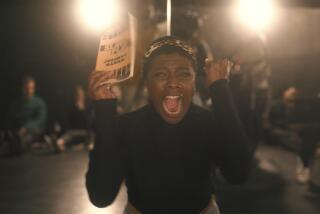Review: Novel take but predictable revelations in âThe Whipping Manâ
Remember the scene in âGone With the Windâ when Scarlett fries latkes for a Hanukkah party at Tara? No? Right, there wasnât such a scene. American Civil War sagas seldom reflect a Jewish perspective.
Matthew Lopezâs 2011 play âThe Whipping Man,â now onstage at South Coast Repertory, redresses this omission by imagining a Passover Seder conducted by two newly freed slaves and a confederate soldier in Richmond, Va., in the spring of 1865.
Many Jewish families lived in the antebellum South, Lopez learned. Some of their slaves, maybe, converted to their faith. Itâs certainly possible that, in the wake of the surrender of the Confederacy, the fall of Richmond and the assassination of Lincoln that April, Jews gathered for the Seder -- although itâs unlikely that any of those ceremonies held as many melodramatic revelations as in âThe Whipping Man.â
The Israelitesâ escape from Egypt and the end of American slavery are mutually resonant stories. Logistically, they donât fit together as well, so Lopezâs plot hinges on complex narrative contrivances.
Although the story starts with a bang, the exposition required to catalog all of the exceptions and coincidences responsible for the incredible scenario soon bogs things down. Director Martin Benson and the three lively performers canât quite succeed in keeping up the momentum.
The set by Thomas Buderwitz is a marvel: the capacious ruins of the DeLeon familyâs shelled, burned, looted Richmond house. Seen at first in the dark, illuminated only by flashes of lightning through the broken windows with their shredded lace curtains, it could be a haunted mansion in a Gothic ghost story. As we are soon to learn, it is in fact haunted, by the legacy of slavery.
Accompanied by a thunderclap, Capt. Caleb DeLeon (Adam Haas Hunter) staggers through the front door and, groaning, collapses. The commotion awakens Simon (Charlie Robinson), one of the familyâs former slaves who, assigned to protect the place during the evacuation of the city, threatens the intruder with a rifle.
But when he recognizes Caleb, Simon breaks into a prayer of gratitude -- in Hebrew. It turns out that the DeLeons trained Simon in the beliefs and rites of Judaism, and he is devout.
The rest of the family has safely fled, Simon reassures Caleb, who doesnât seem to be in good shape himself. He has a bullet in his leg, and gangrene has set in.
Simon, who has some wartime medical experience, insists that it must be amputated. Caleb doesnât want to go to the hospital; he begs Simon to do the grisly operation at home.
Another former slave, John (Jarrod M. Smith), turns up the next morning after looting the neighborsâ abandoned houses. Heâs about Calebâs age; the two of them were raised almost as brothers, until a horrible incident that gives the play its title.
John agrees to help Simon perform the amputation, which they undertake with only a saw and some stolen whiskey. Luckily for the audience if not for Caleb, a well-timed blackout, accompanied by a soundtrack of agonized screaming by soundscape designer Michale Roth, intervenes.
Caleb then spends the rest of the play, except for one flashback scene (âHey, heâs got two legs again,â an audience member objected), in terrible shape on a couch. John appears in ever-fancier outfits (by costume designer Angela Balogh Calin) as looted goods pile up in the corners. Simon runs the household and improvises a menu for the Seder: meat from a dead horse, collard greens and hardtack instead of matzoh.
All three men also divulge upsetting secrets at a steady pace. The playwright surely intended these to catch the audience up in a gripping sequence of reversals and twists, but they progressively drain the energy from the stage. One problem may be that the secrets are fairly predictable. (A woman behind me announced, âYeah, thatâs what I figured,â at the final revelation. It was a chatty audience.)
Another problem is that all three actors are required to demonstrate a great deal of angst and suffering for extended times. The wonderful Robinson and the promising Smith are allowed lighter moments and therefore donât collapse under the weight of their grief until the very end.
But Hunter has to be miserable the whole time. He seems emotionally checked out for most of the second act. He has few lines, his Virginia accent is wobbly and his continuous moaning and sobbing are not persuasive.
However, the final scene of this co-production with the Pasadena Playhouse effectively conjures up the long history of racial struggle in our country: The former master and slave silently sharing a bottle, trying to imagine what comes next.
âThe Whipping Man,â South Coast Repertory, 655 Town Center Drive, Costa Mesa. 7:45 p.m. Tuesdays through Fridays, 2 and 7:45 p.m. Saturdays and Sundays. Ends Jan. 25. $22 and up. (714) 708-5555 or www.scr.org. Running time: 2 hours.
Contact the Pasadena Playhouse for details about the run there Feb. 3 through March 1: (626) 356-7529 or PasadenaPlayhouse.org.
More to Read
The biggest entertainment stories
Get our big stories about Hollywood, film, television, music, arts, culture and more right in your inbox as soon as they publish.
You may occasionally receive promotional content from the Los Angeles Times.










